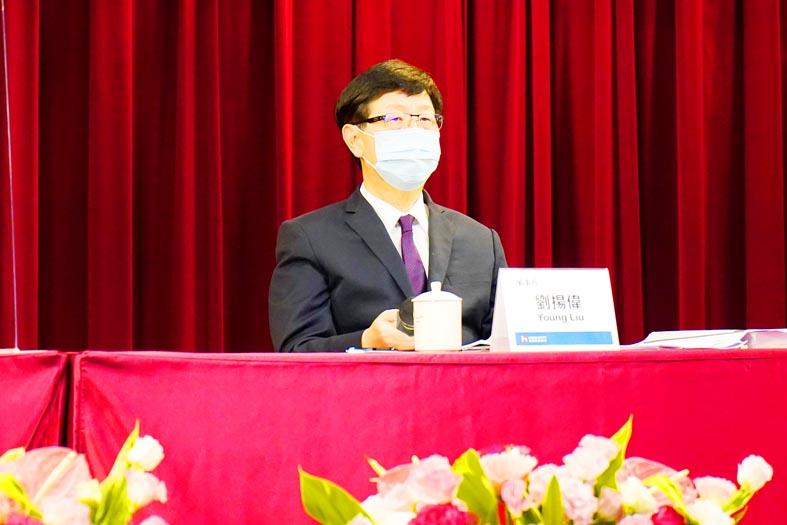Hon Hai Precision Industry Co’s (鴻海精密) sales for this quarter might be flat from the second quarter, it said yesterday after reporting better-than-expected profit for last quarter.
At an investors’ conference in Taipei, chairman Young Liu (劉揚偉) projected revenue for the company, known globally as Foxconn Technology Group (富士康科技集團), would be flat sequentially this quarter, but would increase by 3 to 15 percent year-on-year, amid a possible resurgence of COVID-19 in Asia and uncertainty over the Delta variant of SARS-CoV-2.
“The components shortage will not get better for the second half of the year, but Hon Hai is insulated because we focus on our major customers,” Liu said. “What’s more important to watch for is the impact on the global ICT [information and communications technology] supply chain if the COVID-19 situation deteriorates in Asia.”

Photo courtesy of Hon Hai Precision Industry Co via CNA
Sales at the company’s consumer electronics business, which includes Apple Inc’s iPhone, are projected to decline this quarter compared with the previous three months, Hon Hai said.
Liu said that high comparison numbers in the previous quarter, as well as product transitioning, would result in a slight sequential sales decline in the consumer electronics unit, but total revenue would be little changed sequentially.
The company reported net profit of NT$29.8 billion (US$1.07 billion) in the second quarter, up 6 percent quarter-on-quarter and 30 percent year-on-year. Earnings per share were NT$2.15, up from NT$1.65 a year earlier. Consolidated revenue was NT$1.35 trillion last quarter, up 0.3 percent quarterly and 20 percent annually.
To ensure sufficient supplies, Hon Hai has struck various semiconductor pacts.
It last week announced that it would acquire a mature 6-inch wafer plant from Macronix International Co (旺宏). In May, the company said it was to set up a joint chip venture with Yageo Corp (國巨).
Hon Hai is also targeting electric vehicles (EV) to diversify its business beyond making products for Apple, which accounts for about 50 percent of its revenue.
Although only a small part of the company’s revenue, automotive component sales are to break NT$10 billion this year, representing 40 percent year-on-year growth, Liu said.
“We anticipate more announcements of joint projects in the second half of 2021 in the electric vehicle space,” Liu said. “The revenue growth is going to be even greater in 2022.”
Hon Hai plans to roll out its first electric bus next year, he said, adding that the first Hon Hai electric sedan is to begin production in 2023.
“We predict EV to reach a market penetration of 20 percent, meaning an addressable market in the range of US$600 billion,” Liu said. “With our current EV strategy, we think we can capture five percent of that market share.”
Globally, Hon Hai said it plans to establish EV plants in Thailand and the US.
The US plant would produce 150,000 vehicles per year in 2023, ramping up to 300,000 to 500,000 vehicles per year, it said.
There are “several thousand” Hon Hai employees just working in the EV division, the company said.

Anna Bhobho, a 31-year-old housewife from rural Zimbabwe, was once a silent observer in her home, excluded from financial and family decisionmaking in the deeply patriarchal society. Today, she is a driver of change in her village, thanks to an electric tricycle she owns. In many parts of rural sub-Saharan Africa, women have long been excluded from mainstream economic activities such as operating public transportation. However, three-wheelers powered by green energy are reversing that trend, offering financial opportunities and a newfound sense of importance. “My husband now looks up to me to take care of a large chunk of expenses,

SECTOR LEADER: TSMC can increase capacity by as much as 20 percent or more in the advanced node part of the foundry market by 2030, an analyst said Taiwan Semiconductor Manufacturing Co (TSMC, 台積電) is expected to lead its peers in the advanced 2-nanometer process technology, despite competition from Samsung Electronics Co and Intel Corp, TrendForce Corp analyst Joanne Chiao (喬安) said. TSMC’s sophisticated products and its large production scale are expected to allow the company to continue dominating the global 2-nanometer process market this year, Chiao said. The world’s largest contract chipmaker is scheduled to begin mass production of chips made on the 2-nanometer process in its Hsinchu fab in the second half of this year. It would also hold a ceremony on Monday next week to

TECH CLUSTER: The US company’s new office is in the Shalun Smart Green Energy Science City, a new AI industry base and cybersecurity hub in southern Taiwan US chip designer Advanced Micro Devices Inc (AMD) yesterday launched an office in Tainan’s Gueiren District (歸仁), marking a significant milestone in the development of southern Taiwan’s artificial intelligence (AI) industry, the Tainan City Government said in a statement. AMD Taiwan general manager Vincent Chern (陳民皓) presided over the opening ceremony for the company’s new office at the Shalun Smart Green Energy Science City (沙崙智慧綠能科學城), a new AI industry base and cybersecurity hub in southern Taiwan. Facilities in the new office include an information processing center, and a research and development (R&D) center, the Tainan Economic Development Bureau said. The Ministry

State-run CPC Corp, Taiwan (CPC, 台灣中油) yesterday signed a letter of intent with Alaska Gasline Development Corp (AGDC), expressing an interest to buy liquefied natural gas (LNG) and invest in the latter’s Alaska LNG project, the Ministry of Economic Affairs said in a statement. Under the agreement, CPC is to participate in the project’s upstream gas investment to secure stable energy resources for Taiwan, the ministry said. The Alaska LNG project is jointly promoted by AGDC and major developer Glenfarne Group LLC, as Alaska plans to export up to 20 million tonnes of LNG annually from 2031. It involves constructing an 1,290km